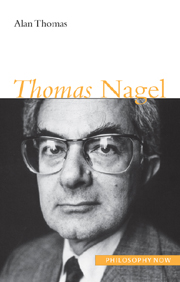Book contents
- Frontmatter
- Contents
- Preface
- Abbreviations
- 1 Subjective and objective
- 2 Understanding, knowledge and reason
- 3 Placing the mind in the physical world
- 4 The possibility of altruism
- 5 Practical objectivity, freedom and a realistic autonomy
- 6 Normative ethics: Nagel's hybrid ethical theory
- 7 Justice, equality and partiality
- Conclusion
- Notes
- Bibliography
- Index
4 - The possibility of altruism
- Frontmatter
- Contents
- Preface
- Abbreviations
- 1 Subjective and objective
- 2 Understanding, knowledge and reason
- 3 Placing the mind in the physical world
- 4 The possibility of altruism
- 5 Practical objectivity, freedom and a realistic autonomy
- 6 Normative ethics: Nagel's hybrid ethical theory
- 7 Justice, equality and partiality
- Conclusion
- Notes
- Bibliography
- Index
Summary
Nagel's first major publication was a revision of his doctoral dissertation, which had been supervised by John Rawls. The Possibility of Altruism is a slender volume, but it is Nagel's most powerful work. It remains, in the opinion of many, his best book. The method Nagel pursues in this book is that of transcendental argument. Arguments of this kind take some fact that we know to be the case as given and work “backwards” to identify the a priori conditions that make this fact possible. Nagel takes as his basic fact the claim that there is a practical use of reason. We do not simply reason theoretically in order to acquire true beliefs; we also apply our capacity to reason in deciding what to do. What must be the case for this to be true? Nagel, like Kant, thinks it is very fruitful to apply this argument strategy not simply to our knowledge of the world, but also to our deliberation and action. The basic question he sets out to answer is what makes practical reasoning practical?
What makes practical reasoning practical?
Nagel's transcendental strategy in The Possibility of Altruism uncovers two surprising consequences of the initial assumption that reason can be practical. The first is that any such reasoning can be characterized not simply case by case via the identification of instances of good reasoning. We can offer a more reflective account in terms of the form of good reasoning.
- Type
- Chapter
- Information
- Thomas Nagel , pp. 107 - 136Publisher: Acumen PublishingPrint publication year: 2008

